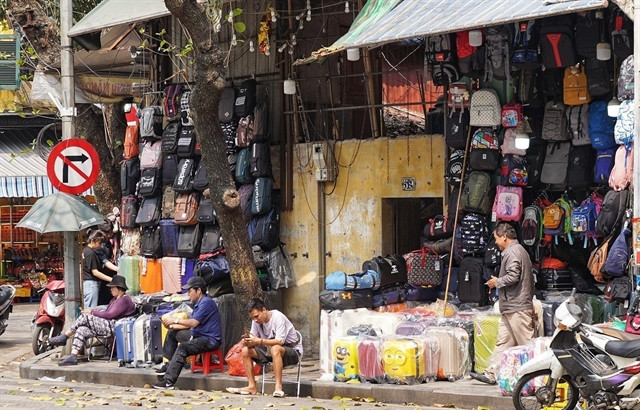 |
| A sidewalk on Đinh Tiên Hoàng Street in Hà Nội has been encroached to sell bags. — VNA/VNS Photo Quỳnh Anh |
Sidewalk and road usage fees collected in big cities like Hà Nội and HCM City will add more to the budget, but the larger goal of the collection is to restore urban order and manage sidewalks in a transparent way to avoid profiteering, according to experts.
HCM City will start collecting the fees from January 1, while Hà Nội’s authorities are proposing running the collection on a trial basis on streets that meet infrastructure conditions.
Hoàn Kiếm District, the city’s central area, proposed the rental on ten streets at 36 locations, including 15 locations on five pedestrian streets of Đinh Tiên Hoàng, Hàng Khay, Hàng Bài, Nguyễn Xí and Lê Thái Tổ.
Twenty-one other locations are on five streets outside the pedestrian zone - Lý Thường Kiệt, Phan Chu Trinh, Bà Triệu, Lê Phụng Hiểu and Ngô Quyền.
The areas for rent for all weekdays will be located two metres from the front of the buildings.
After the pilot period, Hoàn Kiếm District’s authorities plan to propose the rental on more streets located close to the market and having sidewalks at least 3m wide in the Old Quarter. Business households are allowed to rent 1m of sidewalks and must ensure pedestrian space.
Nguyễn Viết Chức, former vice chairman of the National Assembly's Committee for Culture, Education, Youth and Children, said: “There is not any perfect way to manage sidewalks. Banning sidewalk businesses is not okay, but renting the sidewalks must be managed. Sidewalks do not belong to any family, but are a place for people to walk.”
According to Chức the sidewalk rental fee collection is important for sidewalk management’s transparency. There needs a contract between the tenant and the lessor which states clearly how much of the sidewalks can be used to display items for sale. In case of violation, households will be fined or permanently banned from doing business on the sidewalks.
"In my opinion, collecting fees is not to get money. Collecting fees makes the sidewalks more open and managed more systematically. In order for the sidewalk rental business to not turn into group benefits, it must be managed publicly. Having all this information public will help prevent profiteering," he told Voice of Vietnam (VOV).
"It needs supervision on the rental rate and rental protocols. All are in dire need of strict regulations on implementation and supervision to avoid negative loopholes. To prevent profiteering, sidewalk rental prices need to be open for bidding and rental information must be digitalized so that everyone can monitor it."
Revenue from sidewalk fees must also be strictly managed and spent appropriately on renovating roadbeds and sidewalks, he said.
Criteria to classify sidewalks
Architect Đào Ngọc Nghiêm, vice president of the Việt Nam Urban Planning and Development Association, and former director of Hà Nội Department of Planning and Architecture, said sidewalks needed to be strictly managed because they are associated with architecture.
He said since 2015, the municipal authorities had cracked down on businesses on sidewalks four times. The city had piloted the sidewalk rental project in some places in Hoàn Kiếm District like Lý Thường Kiệt Street.
What needed to be done was to harmonise the interests of families living close to the sidewalk and those renting the sidewalks, he said.
He said the amended Land Law had stipulated regulations on the rights of land users, including public land, sidewalks and land of owners of houses adjacent to the sidewalks.
He said the sidewalk leasing project needed to thoroughly study the amended Land Law, adding that there had not been any specific research to classify sidewalks by individual criteria. In the long term, there must be an overall view, classifying sidewalks and determining the function of each street. — VNS